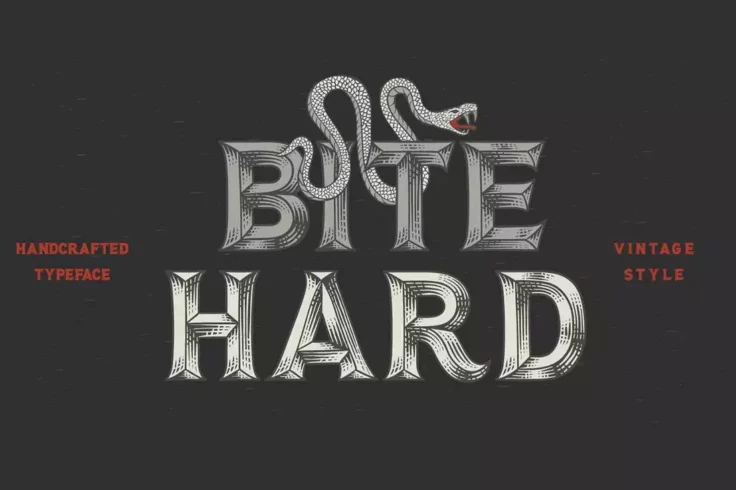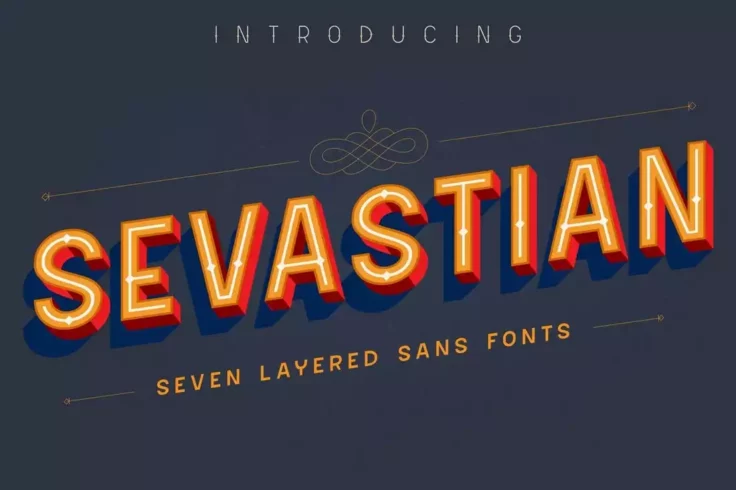15+ Best 3D Fonts
Immerse your audience in the world of 3D fonts. Elevate your designs and messages with fonts that leap off the screen, adding depth and dimension to your work. Our curated collection of 3D fonts offers dynamic shapes and lines, instantly enhancing visual interest. Ideal for bold headlines, vibrant posters, or any project needing a touch of 3D reality. Dive into the realm of 3D typography to create engaging, multi-dimensional narratives.

Bite Hard Vintage 3D Font
A handcrafted font featuring a vintage design. This font also includes a set of characters that comes with a 3D chiseled look. It’s an all-caps ...

Sevastian Layered Shadow Font
Sevastian is one of the best shadow fonts you’ll find on our list. It features a very unique shadow effect that creates a realistic 3D effect. S...
FAQs About 3D Fonts
What are 3D Fonts?
3D fonts, also known as three-dimensional fonts, are a type of typography that appears to be three-dimensional due to its design. They are crafted to visualize depth and volume, making them appear as if they are popping out from the surface or in some cases, sinking into it.
3D fonts are commonly utilized in various designs such as logos, posters, advertisements, video games, signage, and more. They instantly draw attention and add an appealing visual element to any design that makes it more engaging and interesting.
How Can You Make a 3D Font?
Creating a 3D font generally requires design software such as Adobe Illustrator or Photoshop. The process primarily involves using design typography tools to adjust the depth and perspective, and then apply gradient shades or colours along with other design elements to give it a 3D feel.
However, a simple, non-professional way is to use online services that provide automatic 3D text generators. Users can choose from preexisting fonts, customize color, size and depth, and these tools will automatically generate a 3D effect.
Do All Devices Support 3D Fonts?
Generally, 3D fonts are compatible with most devices; however, it truly depends on the specific applications and programs used on these devices. Most desktop publishing or design software support them, but some text editors or word processing applications may not.
For websites, the usage and display of 3D fonts largely depend on the coding and styling applied. It might be better to consider using 3D process rendering through CSS or JavaScript for better compatibility and faster load times.
What’s the Difference Between Regular and 3D Fonts?
The main difference between regular and 3D fonts lies in their visual presentation. Regular fonts are flat, two-dimensional designs that do not have depth or a three-dimensional perspective. They are the default fonts used in most written communications, both digital and print.
On the other hand, 3D fonts are designed to give the illusion of depth and volume. They are not typically used for long texts or paragraphs, but they excel in areas where capturing attention or making a strong visual impact is needed, such as logos, headlines, or ads.
What are the Applications of 3D Fonts?
3D fonts find their use primarily in graphic design endeavors where the goal is to create an instant visual impact. This includes areas like advertising, where a three-dimensional effect can make text stand out and grab the viewer's attention. Logo design also frequently employs 3D fonts for a dynamic and modern look.
In addition to this, 3D fonts are also extensively used in entertainment media such as film titles, video game interfaces, and promotional media. In digital platforms, they are also utilized to create engaging social media posts, blog headers, and other web design elements.